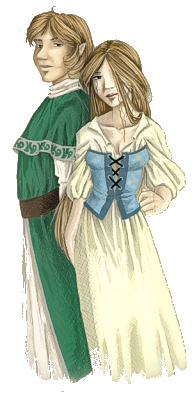|
Half-Elves: From Outsiders to Heroes
The Typical Half-Elf
<<
PREVIOUS • History
of Half-Elves • NEXT >>
 There
really is no such thing as a typical half-elf and this is both their
strength and weakness. It is a strength in that half-elves are usually
adept at expressing themselves as individuals. It is a weakness
because half-elves often feel terribly alone and set apart in ways
that others are unable to comprehend. There
really is no such thing as a typical half-elf and this is both their
strength and weakness. It is a strength in that half-elves are usually
adept at expressing themselves as individuals. It is a weakness
because half-elves often feel terribly alone and set apart in ways
that others are unable to comprehend.
Some half-elves are heavily influenced by the culture in which
they are raised, be it human or elven. Although the culture may
view them as a pariah, they are still a part of and embrace that
culture. This is reflected in their language, tastes, attitudes,
style of dress, etc. Such individuals will often refer to themselves
as an elf or human, and dismiss or attempt to ignore the other half
of their heritage.
Sometimes this close tie with a specific culture becomes something
against which the half-elf rebels. If the individual has experienced
a particularly harsh life, he or she will often come to hate and
despise the culture that birthed and then renounced them. Such people
usually become embittered and have a difficult time finding their
place in the world.
Some half-elves are equally influenced by the cultures of both
their parents and again this is usually reflected in their tastes
and attitudes. This is more commonly found in those who are raised
away from the political and cultural centers of the human and elven
worlds, such as isolated communities and on the frontiers. Such
people often feel no strong specific cultural ties at all.
Though just as a half-elf may rebel against his or her culture,
some half-elves raised without strong ties may often feel their
lack of culture sets them apart even more. They may resent their
lack of a defined place in the world and always be in search of
a way to belong or fit in.
Half-elven life spans can vary dramatically. Some half-elves are
heavily influenced by their elven blood and live for more than a
millennium. Like elves, the aging process is arrested at maturity
for an extended time. Other half-elves are more heavily influenced
by their human blood and have a relatively short life span of only
a few centuries.
It is often assumed that a half-elf will speak both common and
at least one variation of an elven language. However, since there
is nothing typical about half-elves, such assumptions are baseless.
A half-elf will typically speak whichever language(s) they were
raised with.
There are almost as many attitudes and beliefs about their heritage
as there are half-elves. Some half-elves are forever bitter and
resent everyone and everything. Some attempt to pass as full elven
or full human, never admitting to their lack of pure blood. Some
overcompensate for their obviously mixed blood by trying to become
the "perfect" elf or human. A few pride themselves on
having the best qualities of both races and embrace their heritage
as something that makes them unique and an individual who stands
out.
If there is one thing typical of half-elves, it is that they are
likely to leave the community in which they were raised. No matter
where a half-elf is raised and no matter how supportive their individual
environment might have been, they grow up with a sense of themselves
as "other": different and separate from the larger community.
This often leads to an eventual sense of restlessness and a desire
to venture forth to find their own place in the world.
Many half-elves tend to end up in frontier towns such as Wehnimer's
Landing where there is no single predominant culture and where the
races freely mix with each other socially. Half-elves are frequently
vagabonds, explorers, wandering scholars, beggars, outlaws, traveling
merchants, and mercenaries. Those commonly referred to as adventurers
have an unusually high percentage of half-elves among their ranks.
Half-elves seem to be drawn to the excitement and the possibility
of fame and fortune. Many see it as their way to finally make their
mark on a world that has never truly accepted their kind.
|



 There
really is no such thing as a typical half-elf and this is both their
strength and weakness. It is a strength in that half-elves are usually
adept at expressing themselves as individuals. It is a weakness
because half-elves often feel terribly alone and set apart in ways
that others are unable to comprehend.
There
really is no such thing as a typical half-elf and this is both their
strength and weakness. It is a strength in that half-elves are usually
adept at expressing themselves as individuals. It is a weakness
because half-elves often feel terribly alone and set apart in ways
that others are unable to comprehend.